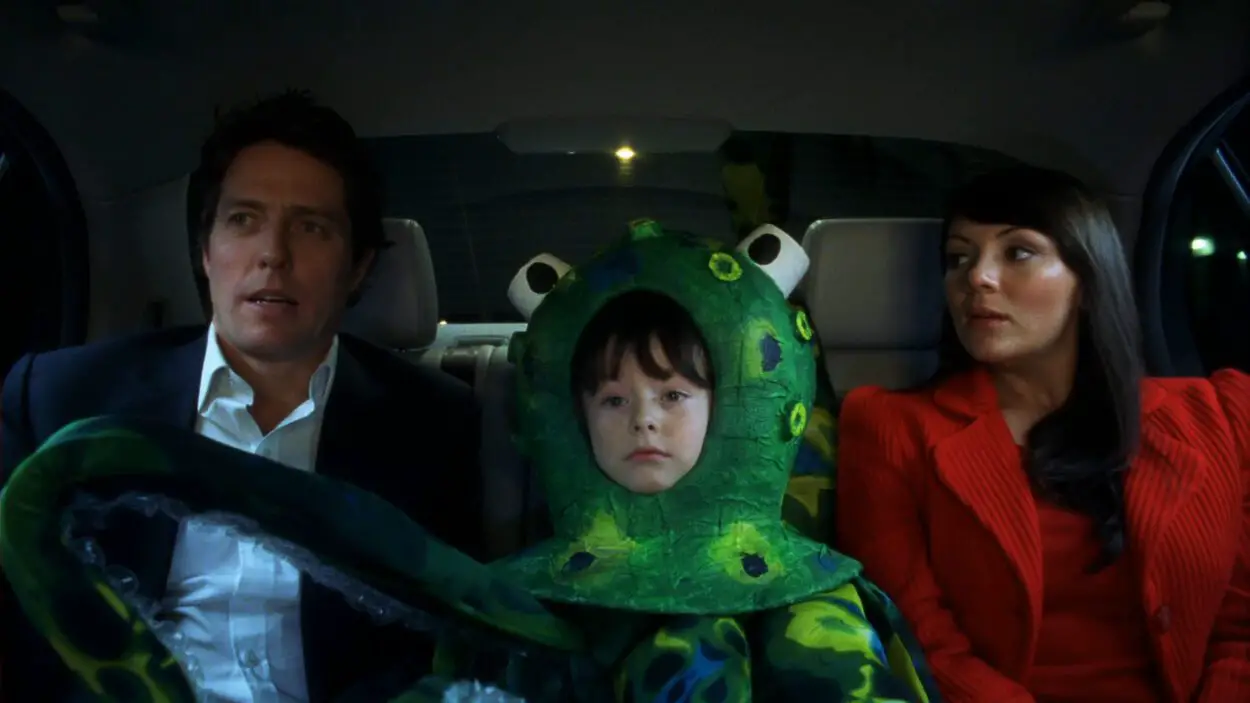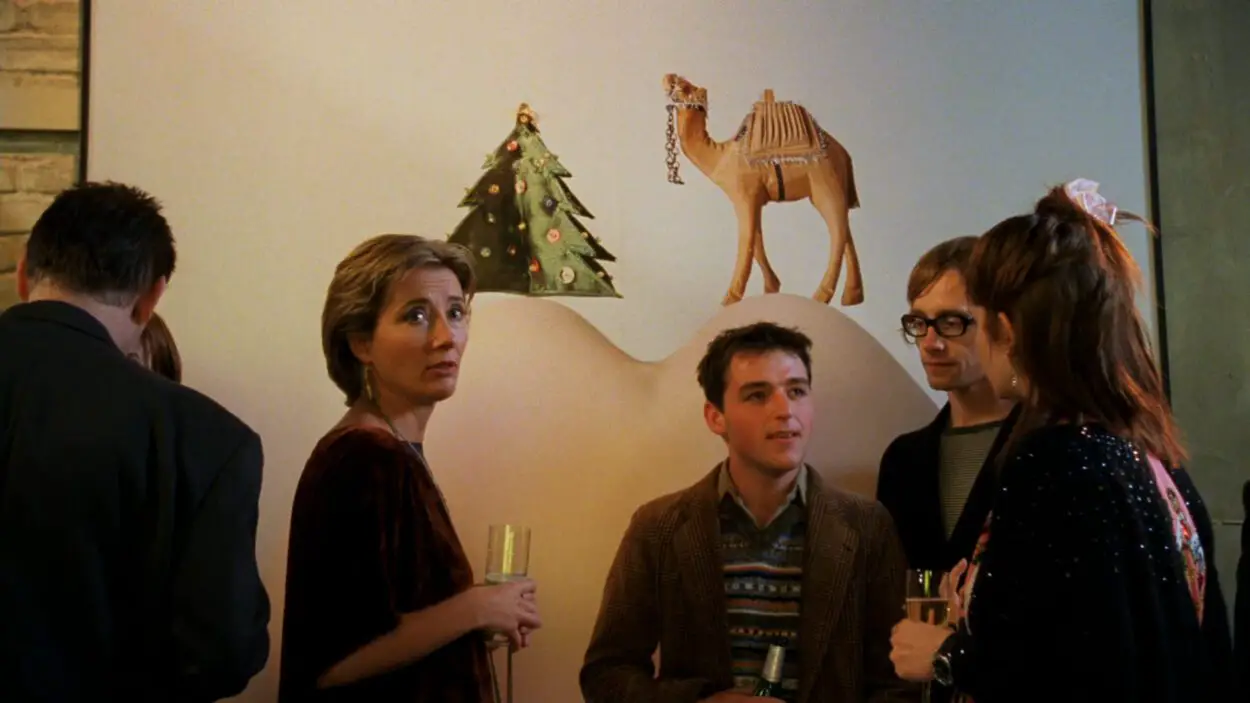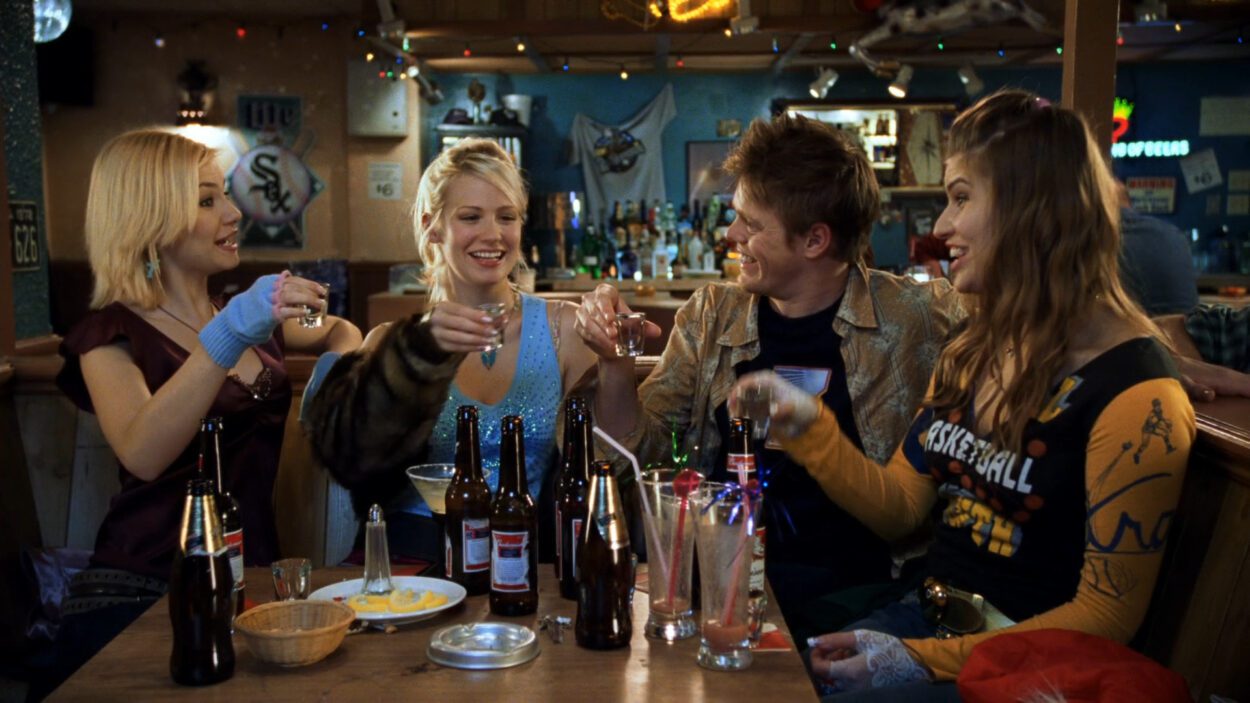There were fewer than five people in the theater when I went and saw Love Actually during its second week back in 2003. I remember loving the film, and not a holiday season has gone by without me watching it, first on DVD, then on Blu-ray, and now in 4K. Over the years, I saw the love of the film grow large enough to have a backlash that has seemingly rendered it less classic than cult, at least in my opinion.
It’s, of course, still possible to catch the movie on cable, but compared to ten years ago, Love Actually is a lot less popular now. There are reasons, which I’ll get to, but I don’t want to bury the lead here. As the title of this article implies, I believe Love Actually is still as good as it’s ever been, even if it’s never been perfect.
Released the same day as Elf, it’s an R-rated British ensemble-romantic comedy-holiday film. Compared to the warm Christmas hug that is the PG-rated Elf, Love Actually is an adult film that, although playful and fanciful, deals with adult themes, has nudity, and has enough language to earn its rating. I wouldn’t say it was guaranteed to be successful.
While Elf sat at number 7 at the domestic year-end box office, Love Actually ended up at number 49. Elf even garnered more favorable reviews. It makes sense that Elf has endured, too, given its rating, which allows the film to be shown ad nauseam throughout the holiday season. I mean, love the film, too. It’s charming and definitely puts me in the Christmas mood. That said, so does Love Actually.
Now look, others have delved into the similarities and the differences between these two films, and for good reasons, not just those mentioned above. What I want to do is look at Love Actually, specifically my own relationship to it, which is the only way I know how to critically think about films when I look back on them. I wish I could be a little more objective, but that wouldn’t be honest. And honestly, I love Love Actually more than I do Elf. Please allow me to explain.
By the end of the ‘90s, if you’d asked me what my favorite American film genre was, I would’ve told you romantic comedies. I loved so much of it, from stuff like It Happened One Night to Annie Hall to When Harry Met Sally… to Notting Hill, and just about everything in between. The movies could be sweet and earnest or clever and ironic. It didn’t matter. I felt like a junkie for the genre at that time.
As for Christmas movies, I had a few I watched every year, though I hadn’t developed a love for that particular genre (if one can call Christmas movies a genre) quite yet. Still, like holiday music, films set during late December always piqued my interest. I loved Christmastime, and if I could bring my love of film into it, well, that was bliss.
So, when I went to see Love Actually, I went for two reasons: it was a romantic comedy, and it was set during the holiday season. Of course, it didn’t hurt that it came from the writer of Four Weddings and a Funeral and Notting Hill, the former I still consider a triumph, and that it looked to be an ensemble piece with a lot of talking. Oh, I was eager to see it.

My first impression of Richard Curtis’ Love Actually? I thought it was excellent, and I can still remember the smile that held on my face during the film’s climax, which I’ll get to later. The film was, and still is, a fine example of a studio romantic comedy. Little did I know that it would signal the dwindling of said genre. While there have been several successful romantic comedies from the major studios over the past twenty years, most haven’t seen the success the genre had before, particularly in the ‘80s and ‘90s. As such, Love Actually, with its large ensemble and scope, feels like the coda to these kinds of movies.
After all, a coda denotes the end of a musical composition, and I feel like this film does just that. It signaled the end, even if I didn’t know it two decades ago. Again, though, don’t get me wrong. I recognize that studios have continued to put out romantic comedies, but in total, they are nowhere near what audiences were given prior to Love Actually. Just looking at the output from the likes of Rob Reiner, Nora Ephron, and Richard Curtis already raises the bar, and that’s such a small sample size.
Starting about ten years ago, I now watch the film as a summation of the genre. The film uses trope and after trope and cliché after cliché. However, it does so in a way that doesn’t imply the film is out of ideas. Rather, it suggests that the filmmakers recognize that their primary audience is familiar enough with romantic comedies that they have come to expect certain things. With Love Actually, Curtis seemed to just say, “Let’s celebrate the genre!”
We have a wedding, unrequited love, a possible affair, two individuals finally taking the next step, plenty of meet-cutes, running through an airport, declarations of love, romantic love, familial love, new love, old love, and so on. Curtis wants to touch on everything in the genre, and even though he isn’t successful in doing so, the attempt is impressive.
And, sure, there’s not a lot of new stuff going on, but there’s a level of respect Curtis gives the genre. He’s earnest rather than ironic, which allows for the tropes and cliches to not come off as a wink to the audience. The movie is ultimately the romantic comedy epic, and once an audience has had that, what else is there?
Part of the reason there might not be as many iconic romantic comedies anymore is that there’s really only so much to be done with a genre before it starts getting repetitive. It takes new approaches to make things interesting. Independent filmmakers have managed to continually breathe new life into the genre, as have foreign filmmakers. However, when was the last time Warner Bros., Universal, or Paramount Pictures put their studio behind a big-budgeted romantic comedy with more earnestness than irony?
Perhaps I’m just getting old, and I’m longing for the old days. I hope not. In fact, I don’t want to come across as someone who thinks Love Actually is a perfect film. It never has been. Even Richard Curtis has his issues with it. The point, though, is that in celebrating a genre in such a big way, Love Actually didn’t leave much to work with, and without enough new life, the genre will remain relatively stagnant. That’s a shame because I still love the genre very much.
Now, why isn’t the film perfect? Two of the storylines have never fully worked for me, and one of them is generally used as an example of how the film doesn’t hold up. Let me start with that one. I’m referring to the Alan Rickman stuff. He’s great, as usual, but I have always had a distaste for stories involving infidelity, and Rickman’s Harry possibly having an affair with his secretary is just ugh. What was the point of this? Other than Curtis wanting everything in the film, I don’t see a reason for it. I don’t see why we need Heike Makatsch’s Mia being so forward with her married boss, and I don’t see why I need for Emma Thompson’s Karen to have her heartbroken. I could rant further, but I just want to be clear. Whether this storyline has aged well or not is beside the point. It was never good to begin with.

My second issue involves Billy Bob Thornton’s President of the United States. Now, on paper, I kind of like the idea of treating Hugh Grant’s Prime Minister David as just another Hugh Grant character. The President comes in and makes a move on David’s love Natalie (played so well by Martine McCutcheon that we should have had a bigger career), which results in David having to go after her. However, it plays so awkwardly that it throws the film off at the point when things should be running smoothly until the last act.
I don’t have an issue with Curtis using the President in this way. In the context of the film, the President is just another character. Even the flow being thrown off isn’t all that bad. For me, the thing that I’ve never liked is how Natalie is treated. I feel like Natalie could’ve had more to do in the film other than be the woman David falls for. Putting her in this position, the film suffers in using Natalie as someone who gets physically harassed by a world leader, only for her to be sidelined until David goes after her. Not to mention, it’s another instance of an office romance that wouldn’t fly if the film were made today. It’s different than Harry and Mia’s story, but it’s in the ballpark, unfortunately.
If I’m being honest, there are scenes I skip whenever I watch Love Actually. I skip some of the Harry and Mia stuff, the President stuff, and a few things here and there. Curtis called the process of editing the movie a catastrophe. With all due respect to Mr. Curtis, the editing isn’t terrible. If he had more time, the film would’ve been different, though I doubt too much.
It’s because there’s so much good stuff in Love Actually to imply it’s a bad movie. I can acknowledge the bad, of course, but that doesn’t take away my enjoyment of the film as a whole. Sure, it demands that audiences be comfortable switching from fairly realistic stories to fantastical ones, but that’s part of the charm for me. I love that in the same film, we get the story of a man (Liam Neeson) who’s lost his wife and now has to raise his stepson alone and the story of another man (Kris Marshall) who goes to America and successfully picks up three girls simply because he’s British.
And I absolutely adore the final twenty minutes or so of the film. It’s a wonderful sequence that begins with Olivia Olson’s Joanna signing Mariah Carey’s “All I Want for Christmas Is You” and ends with that kiss between Jamie (Colin Firth) and Aurélia (Lúcia Moniz). As far as I’m concerned, it’s a tour de force, and if Curtis thinks this entire sequence is a catastrophe, well, one of us is a fool. This sequence sold the film for me the first time I saw it, and I can still feel the smile on my face as I sat in that theater watching it all those years ago.

For me, Love Actually is a classic. In a sense, it’s the last great studio romantic comedy. Is it a classic Christmas film? I would say so. Though Curtis did not originally intend to use the season in the movie, I’m glad he did. I honestly can’t imagine the film without the holiday season in it. Christmastime is used as motivation for so many of the characters’ actions that I just believe Love Actually would’ve lost something special.
I’m not alone in this either. Never did I expect sitting in that mostly empty theater twenty years ago that articles would be written about the film for its twentieth anniversary. Now, sure, the love for the film hit its zenith ten years ago, and since then the film’s been hanging on despite any backlash it’s received since. Even those who are positive towards the movie find faults in it, like me. But that’s okay. Like a lot of films I revisit, Love Actually is very much of its time.
This is apparent in the film’s opening where 9/11 is directly addressed. Even all these years later, the opening hits me, and the closing bookend still feels earned. It’s also clear in the storylines mentioned above, as well as how pretty much every single romantic love story in the film is about heterosexuals. Not to mention that the mention of homosexuality is addressed as throwaway jokes, such as Sarah (Laura Linney) asking Mark (Andrew Lincoln) if he’s in love with his best friend Peter (Chiwetel Ejiofor), or Billy Mack (played to perfection by Bill Nighy) professing his platonic love to his manager Joe (Gregor Fisher) on Christmas Eve.
It’s okay, though. Richard Curtis doesn’t manage to tell every love story in order to get across that “love actually is all around,” but he didn’t have to. Love Actually succeeds in that it reminds me of the possibilities of love. This is why I was such a fan of romantic comedies when I was younger. The genre is steeped in fantasy. No one runs through the airport (certainly not anymore) or flies to another country to propose marriage to someone who speaks another language. But you know what? Maybe it does happen. The optimist in me loves this film, and I’m such an optimist during Christmastime. It makes sense, then, that this film works for me the way it does.
The state of the world has never been great, and it’s hard to listen to a film like this when it states that if you look closely, you can see love everywhere. For some, it can be an impossible task, and to be fair, this film deals with a lot of privileged characters. That said, if you can give yourself over to it, brush aside the stuff that doesn’t work, and accept the fact that the world has changed since 2003, I think you’ll find that love actually really is still all around.



